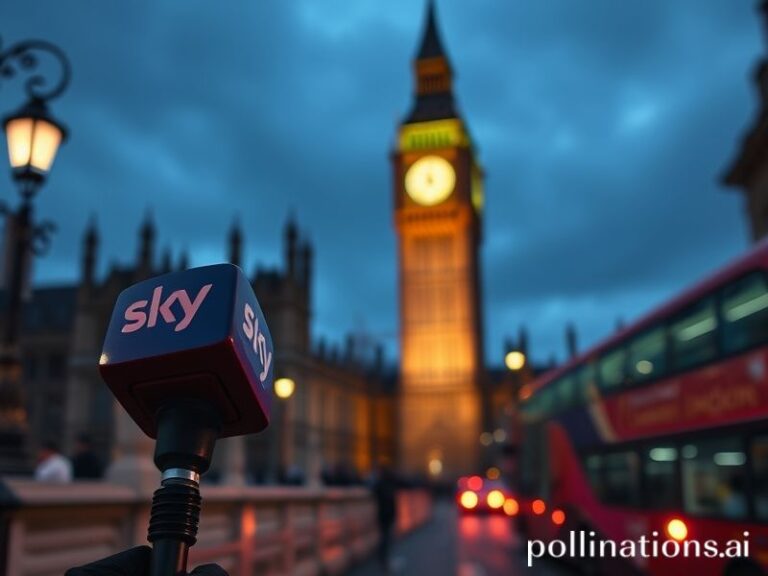Alex Kingston: How One British Actress Became the Global Currency of Nostalgia
In the grand geopolitical theatre currently starring climate refugees, crypto tsars, and whatever Elon Musk tweeted at 3 a.m., it’s easy to overlook a 61-year-old British actress quietly reminding us that time is less a straight line and more a wibbly-wobbly PR crisis. Yet Alex Kingston—yes, the same woman who once sprinted through Cardiff in a spacesuit yelling spoilers at a Time Lord—has become an unexpected barometer for how nostalgia is traded on the global market like cobalt or black-market ventilators.
While diplomats in Geneva were last week debating the finer points of carbon-credit accounting, Kingston was in Rome, filming the new season of “Doc Martin” spin-off fan-fic that no one asked for but everyone will binge. The Italian crew greeted her like visiting royalty, a reaction that would have been unimaginable in 1997 when her character River Song was still just a twinkle in Steven Moffat’s subtext. Back then the world was busy with the Asian Financial Crisis and the faint smell of pre-9/11 denial; now the planet is busy with the Everything Crisis and the strong smell of post-truth aftershave. Kingston’s career arc neatly coincides with the exact moment Western pop culture discovered it could monetise memory faster than a hedge fund monetises debt.
Consider the numbers: Netflix’s international subscriber growth in Q1 2024 was driven largely by back-catalogue “Doctor Who” marathons, with the Philippines, Brazil, and Finland all reporting River Song as a top-ten “rewatch comfort character.” Translation—half the globe is self-soothing with a fictional archaeologist who kills a man with a lipstick and flirts with the concept of linearity. Meanwhile, in the real world, UN peacekeepers in Mali are still waiting for someone to invent a sonic screwdriver that actually fixes potholes.
Of course, Kingston herself is professionally bemused by the whole spectacle. In a recent Zoom interview from her kitchen in Los Angeles—populated by two rescue greyhounds and what appears to be an original Mondrian she swears is “just a good print”—she laughed that trademark husky laugh and admitted she sometimes forgets which country she’s in. “I woke up in Prague last month convinced it was Vancouver,” she said, “but the breakfast goulash cleared that up.” The joke lands harder when you remember that half the world’s workforce now measures jet lag in PCR tests and existential dread.
Her renewed visibility is also a case study in how streaming algorithms weaponise affection. Warner Bros. Discovery’s recent earnings call boasted that nostalgic sci-fi properties outperform new intellectual property by 3-to-1 in emerging markets. Translation: why risk a fresh story when you can simply thaw a 2008 character, add 4K HDR, and sell it to Jakarta? Kingston, ever the pragmatist, signed the licensing paperwork between takes on an indie film about Brexit-era beekeepers. “I’ve played dead twice and a hallucination once this year,” she shrugged. “Capitalism loves a corpse with name recognition.”
Yet there’s a darker punchline. The same week Kingston’s face graced billboards in Seoul, South Korea’s birth rate hit another historic low—0.72 children per woman, a figure so anemic demographers joke the country will soon be staffed entirely by holograms of British actresses. Meanwhile, in the United States, the Supreme Court debates whether fictional time travel constitutes interstate commerce. Somewhere, a think-tank intern is definitely drafting a white paper titled “River Song as Soft Power: The Weaponisation of Chronological Anxiety.” They’ll probably get promoted.
So what does it mean that an English actress who once made out with a Dalek is now a transnational emotional support animal? Maybe only that the 21st century has taught us to export feelings the way the 19th century exported opium—packaged, addictive, and ultimately someone else’s problem. Until the heat death of the universe, Kingston will keep popping up in reboots, reunions, and dubious NFT cameos, offering the same knowing wink to audiences from Lagos to Lapland. We’ll take it, because in a world where the Doomsday Clock is perpetually stuck at 89 seconds to midnight, a woman who can literally schedule her own death and still come back for the wrap party feels like the most honest thing on offer.







